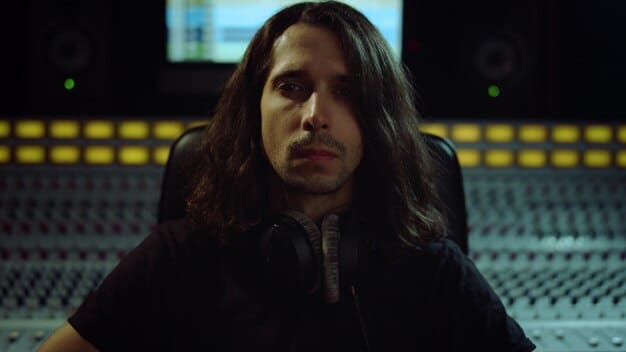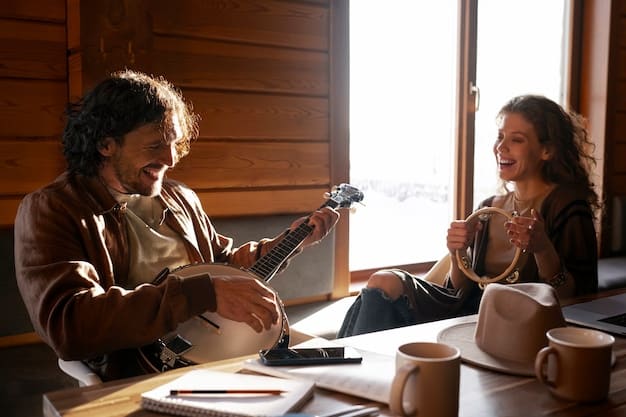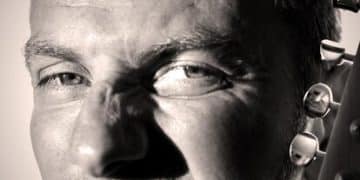Rock Star Secrets: Interview Advice Musicians Wish They Knew

What Rock Musicians Wish They Knew Before Their First Interview boils down to preparation, authenticity, and understanding the interviewer’s perspective to navigate media interactions successfully.
Navigating the world of music interviews can be a daunting experience, especially for rock musicians stepping into the spotlight for the first time; what Rock Musicians Wish They Knew Before Their First Interview often revolves around preparation, authenticity, and understanding the dynamics of media interactions.
Understanding the Interview Landscape
Entering the realm of music interviews can feel like stepping onto a precarious stage; preparation is paramount, and grasping the interview landscape is the first crucial step. Knowing what to expect and how to navigate the process can significantly impact how an artist is perceived by the public.
Researching the Interviewer and Outlet
Before any interview, taking the time to research the interviewer and the media outlet is vital. This preparation helps musicians tailor their responses and understand the tone and focus of the interview.
Knowing Your Audience
Understanding the audience who will be consuming the interview is equally important. Different demographics may require different approaches in how information is presented.
- 🎤 Research the interviewer’s past work & style.
- 📰 Understand the media outlet’s readership/viewership.
- 🎯 Tailor responses to resonate with the intended audience.
Understanding the media landscape and knowing the interviewer and audience are essential first steps. This knowledge enables musicians to approach interviews with confidence and preparedness.

Crafting Your Narrative
One of the most crucial aspects of preparing for an interview is crafting a compelling narrative. This involves knowing the key messages you want to convey and structuring them in a way that resonates with the audience.
Defining Key Messages
Before the interview, identify 2-3 key messages you want to communicate, whether it’s about a new album, a tour, or a personal story. Crafting these messages in advance ensures they come across coherently during the interview.
Storytelling Techniques
Learning to tell compelling stories is essential for engaging your audience. Use anecdotes and personal experiences to add depth and authenticity to your narrative.
- 🎶 Define 2-3 key messages that support goals.
- ✍️ Use anecdotes to humanize the narrative.
- 🗣️ Practice telling stories engagingly.
Crafting a compelling narrative involves defining the key messages and using storytelling techniques to engage the audience. This preparation ensures the interview is both informative and captivating.
Mastering Interview Techniques
Successful rock musicians understand that mastering interview techniques is essential for navigating interactions with the media. This includes learning how to handle difficult questions and manage time effectively.
Handling Difficult Questions
Knowing how to handle tough or controversial questions is crucial for maintaining control of the interview narrative. Prepare responses in advance to avoid being caught off guard.
Time Management and Concise Messaging
Respect the interviewer’s time by keeping responses concise and to the point. Avoid rambling and focus on delivering key information efficiently.
- 🤔 Prepare for challenging questions in advance.
- ⏱️ Be concise and respect the interviewer’s time.
- 🧘 Stay calm and composed, even when things get tricky.
Mastering interview techniques includes learning how to handle difficult questions with poise and managing time effectively by delivering concise messages. Preparation and practice are essential for success.

Maintaining Authenticity and Personality
Authenticity resonates deeply with audiences, making it imperative for rock musicians to let their true personality shine through during interviews. The contrast between genuine expression and manufactured persona can be stark, and fans are quick to discern inauthenticity.
Being Yourself
In an era where genuine expression is prized, allowing your true personality to shine through in interviews can create a stronger connection with fans. Authenticity builds trust and relatability, distinguishing you from others who may attempt to project a manufactured image.
Balancing Privacy and Openness
While audiences appreciate openness, musicians must also strike a balance between privacy and what they share with the public. Determining personal boundaries and sticking to them is crucial for protecting well-being and maintaining a sense of control over one’s narrative.
- 🎭 Avoid pretending to be someone you’re not.
- ❤️ Share personal stories that resonate with true self.
- 🛡️ Set clear boundaries to protect your private life.
Maintaining authenticity and personality in interviews is paramount for building genuine connections with audiences. Audiences appreciate authenticity when musicians are true to themselves, and balancing openness with privacy ensures personal well-being and narrative control.
Maximizing Post-Interview Impact
The work doesn’t end when the interview concludes; maximizing the impact of the interview is essential for reaching a wider audience and reinforcing key messages. This involves leveraging social media and other platforms to amplify the coverage.
Leveraging Social Media
Share the interview across all social media platforms to reach a broader audience. Use engaging captions and visuals to capture attention and encourage sharing.
Analyzing and Learning from Each Interview
After each interview, take time to reflect on what went well and what could be improved. Analyze the audience’s reception and note any areas where communication could be more effective.
- 📢 Share interview clips on social media.
- 📊 Monitor audience reception and feedback closely.
- 📝 Reflect on what worked and what can be improved.
Maximizing post-interview impact includes leveraging social media to amplify reach and analyzing feedback to improve future performances. Consistent effort in these areas can enhance a musician’s media presence.
Building Relationships with Media Professionals
Developing strong relationships with media professionals can significantly benefit a rock musician’s career. These relationships can provide opportunities for future coverage and create a more favorable media environment.
Networking Tips
Attend industry events and press conferences to meet journalists and build connections. Engage in meaningful conversations and follow up after the event to maintain contact.
Treating Everyone with Respect
It’s crucial to treat everyone in the media industry with respect, regardless of their position. Building a reputation for professionalism and courtesy can open doors and create lasting relationships.
- 🤝 Attend industry events to connect with journalists.
- 📧 Follow up with contacts to nurture relationships.
- 🌟 Always treat everyone with respect and professionalism.
Building relationships with media professionals involves networking at industry events, following up with contacts, and treating everyone with respect. Investing time in these relationships can lead to significant benefits for a musician’s career.
| Key Aspect | Brief Description |
|---|---|
| 🎤 Preparation | Research interviewer, outlet, and audience to tailor the message. |
| 🎶 Authenticity | Being true to oneself and sharing personal stories to connect with the public. |
| 🗣️ Communication | Handling difficult questions and delivering concise messages effectively. |
| 🤝 Relationships | Building and maintaining relationships with media professionals. |
Frequently Asked Questions (FAQs)
▼
Many musicians wish they had known the importance of researching the interviewer and media outlet beforehand, allowing them to tailor their responses more effectively.
▼
Prepare talking points in advance, stay calm, and pivot to positive topics; it’s okay to politely decline answering overly personal questions.
▼
Authenticity builds trust with your audience; people connect with genuine personalities more than manufactured personas, enhancing connection and relatability.
▼
Social media amplifies the reach; sharing clips, quotes, and insights on your platforms helps engage a broader audience post-interview, increasing visibility.
▼
Being respectful, professional, and building rapport over time are vital; attending industry events and following up with contacts also strengthens these relationships.
Conclusion
In summary, for emerging rock musicians, mastering the art of the interview is crucial. From thorough preparation and narrative crafting to maintaining authenticity and building media relationships, each aspect plays a vital role. By embracing these insights, musicians can confidently navigate their media appearances, ensuring that their message resonates and their careers flourish.





